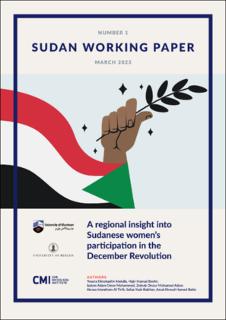A Regional Insight into Sudanese Women’s Participation in the December Revolution
Abdalla, Yusra Elmobashir; Bashir, Hajir Hamad; Mohammed, Isalam Adam Omer, Zeinab Onour Mohamed Adam Hanaa Inbrahiem Al Tirifi; Babiker, Safaa Yasir; Batio, Amal Ahmad Hamed
Working paper
Permanent lenke
https://hdl.handle.net/11250/3059383Utgivelsesdato
2023-03-01Metadata
Vis full innførselSamlinger
- Publications [1488]
Originalversjon
Bergen: Chr. Michelsen Institute (Sudan Working Paper SWP 2023:01) 23 p.Sammendrag
Introduction The popular uprising against the Islamist-Military regime of Omar al-Bashir started in December 2018, and women were at the forefront of the peaceful protests in many locations throughout the country. The uprising, which is now popularly known as the December revolution, started in Damazeen in Blue Nile state with schoolgirls and boys protesting the poor living conditions and scarcity of bread. Street protests spread throughout the country, including to the capital Khartoum. Economic grievances were put in the context of authoritarianism and the corruption of the Bashir regime, which had ruled the country with an iron first for three decades (1989-2019). The main slogan of the protestors became “fall that is all” and “freedom, peace and justice”. After eight months of protests, Bashir was ousted from office through an internal military coup in April 2019. A transitional military council consisting of Bashir’s former allies took control of the state. Hundreds of thousands of Sudanese citizens formed a sit-in in front of the military headquarters in Khartoum demanding a transition to a civilian government. On June 3 rd , the sit-in was crushed by a branch of the military, namely the rapid-support forces (RSF) which until six years ago were better known as the militia janjaweed that fought the war in Darfur on behalf of the Bashir regime. Despite the killing and arrest of protesters during what has been coined the “Sudan massacre”, the protests continued. In August 2019, negotiations between the transitional military council and the Forces for Freedom and Change [1] facilitated a new transitional government guided by the Constitutional Declaration. [2] However, in October 2021, the military hijacked Sudan’s transition to democracy and the transitional government they were part of. This kickstarted new calls for a freedom, peace, and justice under the umbrella of a civilian state. Protests a
Utgiver
Chr. Michelsen InstituteSerie
Sudan Working Paper SWP 2023:01Sudan Working Paper SWP 2023:01
